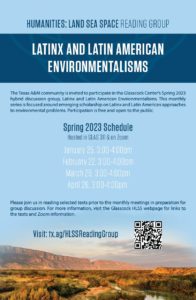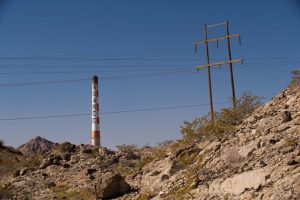Discussion Group
Spring 2023 HLSS Reading Group: Latinx and Latin American Environmentalisms
Zoom and in-person participation welcome.
Click here to fill out the interest form for the Spring semester meetings.
Spring 2023 Semester Schedule
January 25, 3:00-4:00pm
February 22, 3:00-4:00pm
March 29, 3:00-4:00pm
April 26, 3:00-4:00pm
Zoom details: (recurring meeting)
Meeting ID: 967 7526 6983
Zoom link

This reading group will ask the following questions: How do Latin American and North American approaches to environmental problems – whether theoretical, investigative, artistic, or justice-oriented – overlap or diverge? How does the relationship between indigeneity and environmentalism differ between and across postcolonial, post-dictatorship, diasporic, and settler colonial cultural contexts? How do Latinx and/or diasporic communities in the U.S. relate to problems posed by climate change and transnationally extractive capitalism beyond or besides being subject to environmental racism and disenfranchisement? How has hemispheric migration of both individuals and capital shaped rural, urban, and border spaces?
The politicization of climate catastrophe often deploys figures of the globe, and of apocalypse, to establish new universal categories and excuse histories of violence. How can histories of transnational migration, labor exploitation, and coalitional labor organizing reframe what environmentally responsive and responsible politics look like? And how can histories of political violence, fascism, enforced disappearance, and transgenerational trauma help us to understand challenges faced by environmental activists today?
This group will help drive programming for the Land, Sea, Space initiative in Spring, 2023, which will culminate in a symposium focused around emerging scholarship on Latinx and Latin American approaches to environmental problems.
Our next meeting will take place on Wednesday, February 22nd, from 3:00-4:00pm. Please join us in reading the The Ends of the World by philosopher and Brazilian anthropologist couple Déborah Danowski and Eduardo Viveiros de Castro. You may access the text here. Access to text is provided by the TAMU Libraries. Please log in with your TAMU NetID and password to access the eBook.
To review the suggested texts for Spring semester meetings, please click on the hyperlinks below.
2023 Spring Semester Schedule
Monday, December 12, 2023
Like harvesting tarulla: The decolonization of being from a petrolized swamp by Parisa Nourani Rinaldi, Maria Cecilia Roa-Garcia, and Estefany Grajales
Wednesday, January 25, 2023
Reading: Latinx Environmentalisms: Place, Justice, and the Decolonial edited by Sarah D. Wald, David J. Vázquez, Priscilla Solis Ybarra, and Sarah Jaquette Ray
Wednesday, February 22, 2023
Reading: The Ends of the World by Déborah Danowski, Eduardo Viveiros de Castro
Wednesday, March 29, 2023
Reading: Selections from Zero-Point Hubris by Santiago Castro-Gómez, translated by George Ciccariello-Maher and Don Deere
Wednesday, April 26, 2023
Topic: Afro-Pessimism in "We're Going To See Blood On Them Next": Beverly Buchanan's Georgia Ruins and Black Negativity" by Andy Campbell, "Blackness and the Pitfalls of Anthropocene Ethics" by Axelle Karera
“As Above, So Below: Anti-Black Violence as Environmental Racism” by Willie Jamaal Wright (optional)

Vance, Eric. (2011). American Smelting and Refining Company (ASCARCO) [USEPA photo]. El Paso, Texas. Retrieved from Wikimedia Commons database.

Past Discussions
Fall 2021 Virtual Discussion Group: Plants, People, and the Humanities
In Fall 2021, to accompany our Plants, People, and the Humanities event series, the HLSS discussion group will be reading chapters from Robin Wall Kimmerer’s books: Braiding Sweetgrass: Indigenous Wisdom, Scientific Knowledge and the Teachings of Plants (2013) and Gathering Moss: A Natural and Cultural History of Mosses (2003). Electronic editions of her books are available through the TAMU library.
Our next meeting will be Tuesday, December 14, 12:30-1:30pm via Zoom. We will be reading "Burning Sweetgrass" and "Epilogue: Returning the Gift" (pp. 301-384) in Kimmerer's Braiding Sweetgrass: Indigenous Wisdom, Scientific Knowledge and the Teachings of Plants (2013). The book is available as an electronic edition through the TAMU main library.
Meeting ID: 964 8290 2394
Passcode: 787630
Zoom link
Robin Wall Kimmerer “…is a mother, scientist, decorated professor, and enrolled member of the Citizen Potawatomi Nation. She is the author of Braiding Sweetgrass: Indigenous Wisdom, Scientific Knowledge and the Teachings of Plants, which has earned Kimmerer wide acclaim. Her first book, Gathering Moss: A Natural and Cultural History of Mosses, was awarded the John Burroughs Medal for outstanding nature writing, and her other work has appeared in Orion, Whole Terrain, and numerous scientific journals. She tours widely and has been featured on NPR’s On Being with Krista Tippett and in 2015 addressed the general assembly of the United Nations on the topic of “Healing Our Relationship with Nature.” Kimmerer is a SUNY Distinguished Teaching Professor of Environmental Biology, and the founder and director of the Center for Native Peoples and the Environment, whose mission is to create programs which draw on the wisdom of both indigenous and scientific knowledge for our shared goals of sustainability.”
"Celebrating Old Growth"
You might be interested in viewing the discussion hosted by Yale Forest Forum: "Celebrating Old Growth: A Conversation with Robin Wall Kimmerer, Robert Macfarlane, and David Haskell"
Earth Day, Wednesday, April 22, 2020
4:00-5:00 pm (CST), via Zoom
HLSS Discussion Group on Covid-19 and the Environment
Here are a few materials to serve as the basis of our discussion. These short pieces form just a small set of ever-growing responses to environmental, animal welfare, and other issues in relation to the COVID-19 pandemic.
On human-wildlife interactions, environment, climate change:
- An article from Society and Space, by a political ecologist: China's Global Reach: Urban Social Lives of the More-than-Human
- A statement on World Health Day from the UN Biodiversity Convention
- A more historical view: Spillover Warning: How We Can Prevent the Next Pandemic
- An open letter to WHO from wildlife organizations
- A short piece by the head of UNEP
On air pollution:
On sound and the environment:
From Bruno Latour: “A little exercise to make sure that, after the virus crisis, things don’t start again as they were before”
Wednesday October 23rd, 2019
12:30PM - 2:00PM
Glasscock 311
HLSS Discussion Group: Oceanic Humanities Readings
Readings for this meeting are by our two keynote speakers for the Oceanic Humanities symposium. Rozwadowski's 2018 book is available in the library, and further publications can be found here http://fathomingtheocean.com/articles/
Click here to download the reading sample from Rozwadowski.
Click here to download the reading sample from Winkiel.
